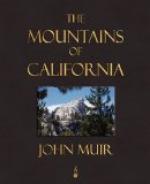One wild winter morning, when Yosemite Valley was swept its length from west to east by a cordial snow-storm, I sallied forth to see what I might learn and enjoy. A sort of gray, gloaming-like darkness filled the valley, the huge walls were out of sight, all ordinary sounds were smothered, and even the loudest booming of the falls was at times buried beneath the roar of the heavy-laden blast. The loose snow was already over five feet deep on the meadows, making extended walks impossible without the aid of snow-shoes. I found no great difficulty, however, in making my way to a certain ripple on the river where one of my ouzels lived. He was at home, busily gleaning his breakfast among the pebbles of a shallow portion of the margin, apparently unaware of anything extraordinary in the weather. Presently he flew out to a stone against which the icy current was beating, and turning his back to the wind, sang as delightfully as a lark in springtime.
After spending an hour or two with my favorite, I made my way across the valley, boring and wallowing through the drifts, to learn as definitely as possible how the other birds were spending their time. The Yosemite birds are easily found during the winter because all of them excepting the Ouzel are restricted to the sunny north side of the valley, the south side being constantly eclipsed by the great frosty shadow of the wall. And because the Indian Canon groves, from their peculiar exposure, are the warmest, the birds congregate there, more especially in severe weather.
I found most of the robins cowering on the lee side of the larger branches where the snow could not fall upon them, while two or three of the more enterprising were making desperate efforts to reach the mistletoe berries by clinging nervously to the under side of the snow-crowned masses, back downward, like woodpeckers. Every now and then they would dislodge some of the loose fringes of the snow-crown, which would come sifting down on them and send them screaming back to camp, where they would subside among their companions with a shiver, muttering in low, querulous chatter like hungry children.
Some of the sparrows were busy at the feet of the larger trees gleaning seeds and benumbed insects, joined now and then by a robin weary of his unsuccessful attempts upon the snow-covered berries. The brave woodpeckers were clinging to the snowless sides of the larger boles and overarching branches of the camp trees, making short nights from side to side of the grove, pecking now and then at the acorns they had stored in the bark, and chattering aimlessly as if unable to keep still, yet evidently putting in the time in a very dull way, like storm-bound travelers at a country tavern. The hardy nut-hatches were threading the open furrows of the trunks in their usual industrious manner, and uttering their quaint notes, evidently less distressed than their neighbors. The Steller jays were of course making more noisy stir




